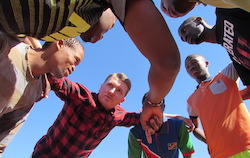African youth gets on-board with new service model of participatory development as a springboard to opportunity
Young people in middle to lower income countries are often marginalised. Issues around levels of education, gender, self-esteem, geographic location and transport availability often compound this. One area where marginalisation is often most pronounced is with youth unemployment. Acknowledging the complexity of issues contributing to youth unemployment, the EU-supported PARTY project(opens in new window) set out to create participatory tools for transformational change that could help youth address their unemployment in a proactive way. Co-creating solutions The San groups are just one of many indigenous populaces in South Africa and Namibia. PARTY focused on the San people as they face acute social, cultural and political challenges – exacerbating marginalisation – and are often among the poorest in their countries. The project first undertook research to establish the most ethical processes to follow. With African partners, the team worked throughout on the creation of ethical guidelines to ensure that all researchers worked with the same ethical orientation towards indigenous issues. These guidelines – which are being continually updated – will offer a much-needed tool for future researchers. A series of workshops were organised, initially for the San youth and latterly for possible stakeholders, to help engage participants, understand their needs and set the parameters for the design of successful participatory tools. Explaining the project’s methodology, Marie-Curie Fellow Ms Maija Rautiainen says, “Participatory actions to increase youth empowerment are very impactful. They help young people process their challenges and come up with potential responses instead of having these introduced from outside. It gives them ownership of their situations.” PARTY developed art-based methods for empowerment, resulting in exhibitions alongside an online handbook(opens in new window) of methods and tools used in the project. This later was designed as a resource for other projects and is already being adopted by partners. The project sparked local actions, with Radio Youth Footprints being a good example. The initiative was created in close collaboration with the youth from the local community and XK FM(opens in new window), the local radio station. XK FM provides news and information to the !Xun and Khwe San communities in their mother tongue. Radio Youth Footprints hopes to see more local young people become involved with the station’s work, giving them the chance to develop new skills. A pilot trial will be conducted by XK FM. Overall, the participatory methods followed a clear trajectory from individual empowerment to community involvement. PARTY found that those participants who committed to the process remained engaged with continuing actions after the project finished. As Ms Rautiainen summarises, “The tools supported the youths’ motivation and ability to participate in the development of their own community. They helped enable their integration into their national socio-economic systems.” Knowledge transfer In terms of her own professional development, Ms Rautiainen feels that her work with partners from different sectors has enabled her to develop a wider set of skills. “These skills allow me to be both more innovative and more practical, while contributing to technology transfer between Europe and Africa,” she elaborates. Lessons learned and documented during the project could be valuable when it comes to tackling similar challenges faced by marginalised communities in Europe, and further afield. This could be especially true when methods for responding to youth employment, indigenous rights or development innovations, need to be adapted to the local context.







